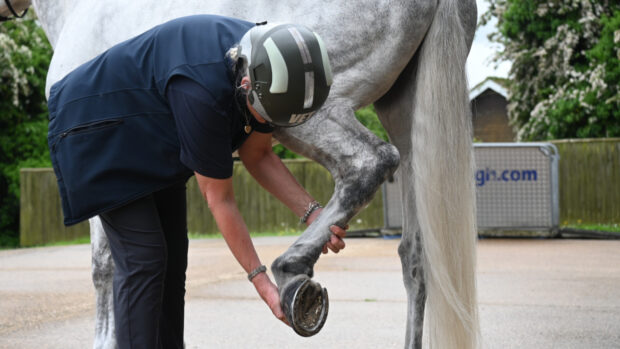THE frequency with which “critically important” antibiotics are being given to horses, often without appropriate testing, is a concern, as research reveals details of the drugs’ use in UK equine veterinary practices.
To mark World Antimicrobial Awareness Week (18–24 November), the Royal Veterinary College (RVC) has released its findings from a study of prescription data.
“The research, the first of its kind, reveals the extent to which antimicrobials are prescribed to equines and uncovers the lack of routine culture and sensitivity testing, particularly prior to the prescription of the ‘last resort’ category B antimicrobials, whose efficacy needs to be preserved for the treatment of serious illnesses in human medicine,” an RVC spokesman said.
“Antimicrobial resistance poses a significant and increasing threat to human and animal health. Concerns have been raised regarding the potential inappropriate and overuse of antimicrobials in veterinary species, which is known to contribute to the development of resistant bacterial populations.
“Once antimicrobial resistance develops, it can result in treatment failure in veterinary patients and, due to the proximity in which animals and their owners often live, the potential transfer of resistant bacteria to people.”
Little work had been carried out to monitor use of antibiotics in horses in this country before this study, of prescription data and clinical notes from 64,322 equids in 2018, supplied by 39 vet practices.
It was found that about 20% of the animals were prescribed antibiotics, and nearly 9% of these were given a category B drug, one that is “of highest priority critical importance for human medicine and should be used cautiously in animals to mitigate the risk to public health”.
Bacteriological culture and sensitivity testing was rarely used, despite its importance in protecting against antimicrobial resistance by determining the most appropriate drug to use, and there was limited compliance with antimicrobial stewardship guidelines on testing.
It is hoped the study will “encourage others to consider and benchmark their own usage, and promote more responsible antimicrobial prescription, especially of those deemed of the highest priority critical importance for human health”.
Sarah Allen, of the RVC’s VetCompass programme, said: “The surveillance of equine antimicrobial usage helps the veterinary profession demonstrate their commitment to the responsible prescribing of antibiotics in the horse. We hope that by reporting on how commonly antimicrobials are prescribed to horses, and demonstrating where stewardship may be improved, others will look to compare and better their own prescribing of these vital medicines.
“The importance of culture and sensitivity testing is well known by veterinary practitioners, however, more still needs to be done to encourage its routine use, particularly prior to the prescription of category B antimicrobials. Not only will this help preserve their medicinal effectiveness and ensure the continued rights of veterinary practitioners to prescribe these critical classes, it will also crucially help minimise the detrimental effects of antimicrobial resistance on human and animal health.”
British Equine Veterinary Association (BEVA) president David Rendle told H&H he was pleased to see the data released.
“It highlights some very important issues that BEVA is working hard to address and provides much-needed evidence to inform our priorities,” he said.
“It is disappointing to see the frequency with which category B antimicrobials are being used and that culture and susceptibility testing are not being used more frequently prior to the use of these critically important medicines.
Unfortunately, there are real challenges around prescribing antimicrobials in horses and it is not always possible to avoid the use of these medicines or to obtain the appropriate samples prior to their use. But there is clearly a need for us to redouble our efforts to reduce, refine and replace the use of certain antimicrobial classes and antimicrobials generally.
“BEVA has been lobbying for new, lower-category antimicrobials to be produced for use in equines and will be presenting educational pieces on antimicrobial stewardship through the awareness week. We would urge horse owners to support their vets in reducing the use of antimicrobials and to respect their vets’ decisions if they suggest antimicrobials aren’t necessary or they advise alternatives to category B antimicrobials. Antimicrobial resistance is an issue that affects us all and we all need to work together to combat it.”
You might also be interested in:

Antibiotic use is dropping while the fight against resistance goes on *H&H Plus*
There has been a significant fall in the use of the drugs in horses, but while positive, the figures do

If in doubt, don’t! The dangers around antibiotic resistance in horses *H&H Plus*

Subscribe to Horse & Hound magazine today – and enjoy unlimited website access all year round
Horse & Hound magazine, out every Thursday, is packed with all the latest news and reports, as well as interviews, specials, nostalgia, vet and training advice. Find how you can enjoy the magazine delivered to your door every week, plus options to upgrade your subscription to access our online service that brings you breaking news and reports as well as other benefits.




